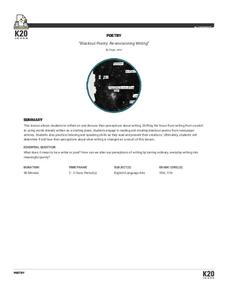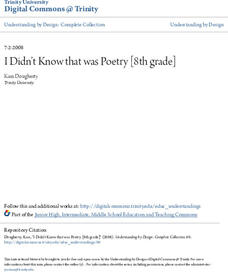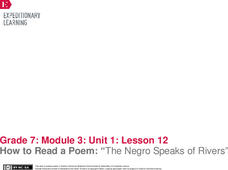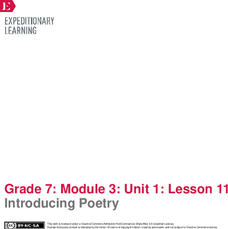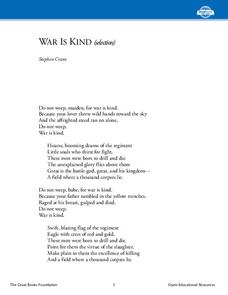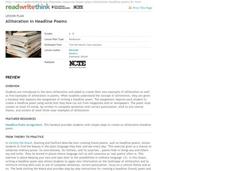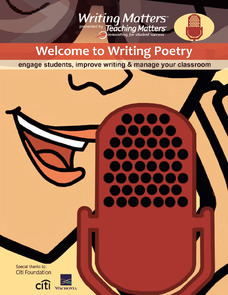K20 Learn
Blackout Poetry: Re-Envisioning Writing
Shed light on the beauty of language with a great poetry activity. After learning about Austin Kleon's blackout poetry model, pupils respond to some of his poetry and use it as a model to produce their own. Young writers also share their...
Academy of American Poets
Women in Poetry
Imagine linking poetry to technology! Thirty-three lessons comprise a 6-week "Women in Poetry" unit for high schoolers. Class members research women poets, learn how to respond electronically to discussions, write their poems, create web...
Trinity University
I Didn’t Know that was Poetry
Poetry or prose? That is the question facing middle schoolers as they begin a month-long poetry unit by examining the characteristics that differentiate poetry and prose writing. Pupils learn about poetic devices and different types of...
Trinity University
The Shakespearean Sonnet
Looking for a great lesson to teach your class everything they need to know about Shakespearean sonnets? Here's such a lesson. "Sonnet #18" launches a study of the Shakespearean sonnet. Scholars watch two Prezi presentations that provide...
Curated OER
Modern and Classical Poetry
A fabulous presentation of poetry awaits your students. This rich, 14-slide PowerPoint presents many excellent ways for your pupils to compose poems. The presentation encourages them to play with words when composing poems, to analyze...
National Endowment for the Humanities
Arabic Poetry: Guzzle a Ghazal!
Learners research the evolution and cultural significance of the Arabic ghazal form of poetry. They, in groups, compose an original ghazal poem and read it aloud to the class.
California Department of Education
Call the Tune: Music in Literature
I am dancing to the music in my head. Scholars learn to listen for music in their heads as they read literature and poems. After they identify and analyze poetic devices that relate to music, they create their own musical poems.
Teaching Tolerance
Poetry and Storytelling Café
Academics take turns as actors in an engaging poetry cafe. Elementary learners work in small groups to create original poems or stories addressing community issues and read their work in front of a live audience. Scholars also reflect...
EngageNY
Poetry Analysis: Small Group Practice
Howdy partner! After discussion and teacher model reading of Slaveships, scholars pair up for a partner reading of the poem. They then use equity sticks to discuss their thoughts of the poem with the class. Readers talk about allusion,...
EngageNY
How to Read a Poem: “The Negro Speaks of Rivers”
Learners listen as a teacher models how to read a poem using The Negro Speaks of
Rivers. They use the How to Read a Poem anchor chart to help guide their thought process on how a poem requires different reading than other text. While...
EngageNY
Introducing Poetry
A silent reading session permits class members to meet individually with their teacher to discuss their text. Learners then discuss and express their observations about two poetry quotes, recording thoughts about craftsmanship, forms of...
Poetry4kids
How to Write an Alliteration Poem
Learners follow five steps to compose an alliteration poem. They choose one consonant and brainstorm as many nouns, verbs, and adjectives they can think of to create rhyming sentences that come together in a poetic fashion.
Poetry4kids
Simile and Metaphor Lesson Plan
Similes and metaphors are the focus of a poetry lesson complete with two exercises. Scholars read poetry excerpts, underline comparative phrases, then identify whether it contains a simile or metaphor. They then write five similes and...
Great Books Foundation
War Is Kind
Ponder the complexities of war, peace, and country with Stephen Crane's "War is Kind." After reading the poem, learners answer six questions in a class discussion or as an individual assessment.
National Center for Families Learning
The Summer Fun Summer Learning Poetry Unit
Focus on poetry this summer to enhance those comprehension, fluency, and language skills with a set of resources intended to explore different types of poetry, specifically lyric poetry. The daily activities contain differentiation ideas...
Scholastic
Lesson Two: The Earth, Introductory Activities
Determine what young pupils already know about earth science with a brainstorming activity. After class members work together to complete a KWL chart about the Earth, they craft an acrostic poem to demonstrate their understanding.
ReadWriteThink
Diamante Poems
The blank page can be a huge hurdle to overcome when writing a poem. Take that hurdle away with an interactive format that enables pupils to write elegant diamante poems. After they add the first and last words in two separate fields,...
Soft Schools
Onomatopoeia
Drip drop goes the raindrop. Quack quack goes the duck. What other words have sounds? Reinforce the concept of onomatopoeia in a activity in which young poets identify animal sounds and items that make a given sound.
Hong Kong Special Administrative Region
Learning English through Poems and Songs
Exposing learners to the power of words in poetry is a stimulating way to learn languages. Songs, haikus, rhyming words, and narrative works are all employed in a resource for teaching English as a Second Language.
Core Knowledge Foundation
Sixth Grade Poetry
Study some of the most prominent poets and works of poetry in history with a language arts poetry unit. From Virgil to Shakespeare to Dickinson to Angelou, the resources present biographies and examples of poetic elements to the sixth...
ReadWriteThink
Alliteration in Headline Poems
Poetry is everywhere you look! Create found poems using headlines from newspapers and magazines. Young poetry focus on creating alliterative phrases with words they find in headlines, tying their poems to a central theme.
Teaching Matters
Welcome to Writing Poetry
Your pupils are poets, and now they'll be able to show it with the exercises in this packet. The lessons, designed for beginner, intermediate, and experienced poets, not only feature a variety of poetic forms, but take learners through...
K12 Reader
Adventures with Alliteration! - Adjectives
Have hearty humor with a handy, helpful handout! Kids work on their alliteration skills with a figurative language worksheet that focuses on alliterative adjectives and phrases. After kids add nouns to ten adjectives, they create five...
E Reading Worksheets
Poetic Devices Finder
Track the poetic elements in any text with a guided reading worksheet. Kids note examples of consonance, alliteration, onomatopoeia, repetition, rhyme, and rhythm when reading a poem or story, and provide a short explanation as to why...


